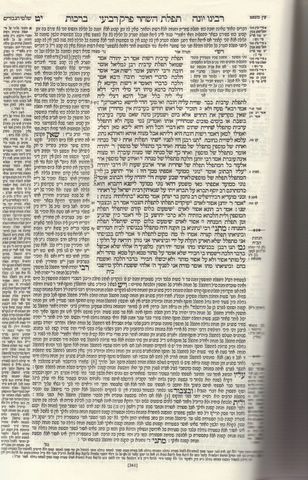
19a
{continuing Brachot 27b}
[{The Mishna said:} "THE EVENING PRAYER {Maariv} HAS NO FIXED LIMIT."
What does it mean it has no fixed limit? It has no fixed limit according to the one who says]
the Maariv prayer is optional.
Rav Yehuda cited Shmuel: Rabban Gamliel says it is obligatory, and Rabbi Yehoshua says it is optional.
Abaye says: The halacha is like the one who says it is obligatory.
And Rava said: The halacha is like the one who says it is optional.
And we establish that the halacha is like Rava. However, these words are only when he has never prayed it {Maariv}, but once you have prayed the evening prayer {Maariv, once}, he has already transformed it for himself into an obligation, and if he errs, he returns to the beginning, as we have said.
Rava {our Gemara has Rav Anan citing Rav}: If he erred and did not mention Rosh Chodesh {Yaaleh VeYavo} at night {that is, in Maariv}, we do not cause him to return, since they {the court} only sanctified the month by day.
And we deduce from this that if he erred and did not mention at night the Shabbat, or Yom Tov, we do cause him to return.
And we also say that if he erred and did not pray Maariv, he prays Shacharit twice, and this is the words of all, for there is no one {we see} that argues, and even the one who says it is optional {reshut}, this just means that it is not an obligation {chova}, but a mitzvah there is; and nowadays the world is accustomed to make it into a chova, obligation.
{Brachot 28a}
The Sages learnt {in a brayta}: If there were before him two prayers, one of Mincha and one of Musaf, he should pray Mincha and then Musaf. Rabbi Yehuda says: He prays of Musaf and then of Mincha, for this mitzvah {Musaf} passes {will soon lapse}, and this mitzvah does not {soon} pass.
Rabbi Yochanan said: The halacha is that one prays Mincha and then Musaf.
Rabbi Eleazar said: One who prays Shacharit after four hours {, the time limit} of Rabbi Yehuda, upon him Scriptures states (Tzefania 3:18)
| יח נוּגֵי מִמּוֹעֵד אָסַפְתִּי, מִמֵּךְ הָיוּ--מַשְׂאֵת עָלֶיהָ, חֶרְפָּה. | 18 I will gather them that are far from the appointed season, who are of thee, that hast borne the burden of reproach. |
| יח נוּגֵי מִמּוֹעֵד אָסַפְתִּי, מִמֵּךְ הָיוּ--מַשְׂאֵת עָלֶיהָ, חֶרְפָּה. | 18 I will gather them that are far from the appointed season, who are of thee, that hast borne the burden of reproach. |
Rav Nachman bar Yitzchak said: {you can derive the meaning of nugot} from here: (Eicha 1:4)
{Brachot 28b}
Rabbi Yochanan said: One is forbidden to make his prayer precede the prayer of the congregation.
Rav said: {When he is standing} with the congregation is where the taught {this law, but when alone, he may}.
Rav Huna said: It is forbidden for one to taste anything before praying Musaf.
And the halacha is not like him, nor like Rabbi Yehoshua ben Levi, who said: once the time of Mincha arrives, it is forbidden for one to taste anything before praying Mincha.
MISHNAH.
R. NEHUNIA B. HA-KANEH USED TO SAY A PRAYER AS HE ENTERED THE BETH HA-MIDRASH AND AS HE LEFT IT — A SHORT PRAYER.
THEY SAID TO HIM: WHAT SORT OF PRAYER IS THIS?
HE REPLIED: WHEN I ENTER I PRAY THAT NO OFFENCE SHOULD OCCUR THROUGH ME, AND WHEN I LEAVE I EXPRESS THANKS FOR MY LOT.
Gemara:
The Sages learnt {in a brayta}: On his entrance, what does he say? 'May it be Your will, O Lord my God, that no offence may occur through me, and that I may not err in a matter of halachah and that my colleagues rejoice in me1, and that I may not call unclean clean or clean unclean, and that my colleagues may not err in a matter of halachah and that I may rejoice in them'. And on his exit, what does he say? 'I give thanks to You, O Lord my God, that You have set my portion with those who sit in the Bet haMidrash...
1 According to Rashi, this is a prayer that he does not err and that his colleagues should not, as a result of his error, rejoice on his account. The same later about his colleagues erring.



No comments:
Post a Comment